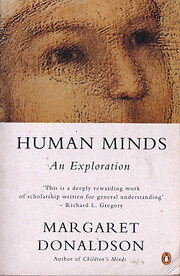

Click on a thumbnail to go to Google Books.
|
Loading... Human Minds: An Exploration (Penguin Psychology) (edition 1993)by Margaret Donaldson (Author)
Work InformationHuman Minds: An Exploration by Margaret Donaldson
 None No current Talk conversations about this book. No reviews no reviews | add a review
Belongs to Publisher Series
"This book is about how our minds develop and how they might develop. What possibilities are open to us? What choices do we have to make, individually and collectively, and how might we be helped or constrained? In discussing these subjects Margaret Donaldson builds on the ideas expressed in her classic work, Children's Minds." "Donaldson proposes an analysis of modes of mental functioning, which, by drawing new distinctions and revealing new connections, illuminates much that has been obscure. It emerges that three kinds of development occur: the addition of new modes to the established repertoire; the achieving of new competence within an established mode; and the development of the ability to control the repertoire or to shift from mode to mode at will. The last of these has received the least explicit attention in western cultures. This leads to some speculations of profound importance, bringing into focus certain questions about the relations between thought and emotion. Are our emotions bound to remain relatively primitive by comparison with our sophisticated forms of thought, as is often assumed? Or do we have open to us advanced forms of emotional development that are commonly unrealized?" "Donaldson concludes that this possibility does exist. In the course of her discussion, she turns to a consideration of history and especially of the changes that came about with the advance of science and the Enlightenment. The demands of the argument lead to questions about the characteristics of the world's greatest religions, particularly Buddhism, which emerges as relevant in what it has to say about certain kinds of personal growth. The scope of this book and the clarity of its style mean that it will be very widely read. Its importance for psychologists and educators will be evident. But the way it bears on the conduct of life could make a difference to us all."--BOOK JACKET.Title Summary field provided by Blackwell North America, Inc. All Rights Reserved No library descriptions found. |
Current DiscussionsNonePopular covers
 Google Books — Loading... Google Books — Loading...GenresMelvil Decimal System (DDC)153Philosophy & psychology Psychology Conscious mental processes and intelligenceLC ClassificationRatingAverage: (3.5) (3.5)
Is this you?Become a LibraryThing Author. |
||||||||||||||||||||||||||||||||||||||||||||||||||||||||||||||||||||||||||||||||||||||||||||||||||||||||||||||||||||||||||||||||||||||